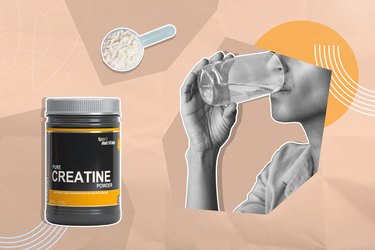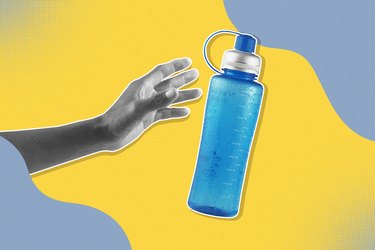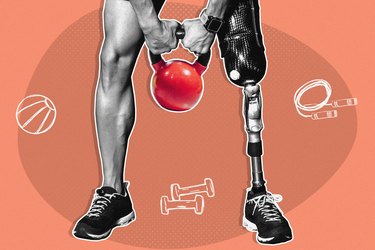
While protein powder is among the most popular, creatine is quickly gaining more time in the spotlight.
"Creatine is a compound that is naturally produced in the liver, kidney and brain," explains Neil Paulvin, DO, a functional and integrative sports medicine doctor. "It is a natural source of energy supplied to muscle tissues and can promote muscle growth and increased athletic performance when combined with exercise."
Video of the Day
Video of the Day
Though it's found naturally in the body and in certain food sources, such as milk and seafood, it's also manufactured as a nutritional supplement.
When taking any new supplement, you'll want to check with your doctor and take it as intended. Taking creatine is pretty straightforward, but rumor has it that creatine should be taken with plenty of water. We asked experts to set the record straight.
Tip
Creatine acts as a shuttle of energy for the muscles and brain. It works by rerouting water to the muscles, so creatine should be taken with plenty of water to ensure the rest of the body has the water it needs to carry out essential functions.
Side Effects of Not Drinking Enough Water While Taking Creatine
If you're looking into creatine for its cognitive and muscle-building benefits, you may have heard to drink more H2O while using it.
There's some truth to this — it is important to stay hydrated when taking creatine.
"Maintaining proper hydration is key as creatine pulls water from your bloodstream to build up muscle after exercise," Paulvin says. "If you don't hydrate yourself properly, creatine can't provide your muscles with power."
"Transporting water to the muscles makes less water available for the rest of the body," Paulvin says, adding that any weight gain could be attributed to water retention or increased muscle mass — not fat gain.
Water Retention
Early studies found that water retention was a common side effect of creatine supplementation, but this usually only lasts for the first few days while taking it, according to February 2021 research in the Journal of the International Society of Sports Nutrition.
Coincidentally, drinking more water can reduce water retention when taking creatine. "Creatine tends to draw water into the muscle, so it's important to take in enough water to ensure that there is adequate fluid in circulation," says sports dietitian Susan Bowerman, RD, CSSD.
Dehydration Risk?
Contrary to popular belief, creatine may actually reduce the risk of dehydration rather than cause it, per the Mayo Clinic.
Researchers insist that it's a myth that creatine causes dehydration. Creatine increases total body water, so it may reduce the risk of dehydration, according to a widely cited August 2008 review in the British Journal of Sports Medicine.
Creatine Dosage
The recommended dosage for most people is 3 to 5 grams per day or 0.1 grams per 2.2 pounds of body weight per day, according to the February 2021 Journal of the International Society of Sports Nutrition study.
Uses for Creatine
So, why is creatine so popular? For starters, it has beneficial effects on energy, muscle mass and brain health.
Energy
It's one of the body's natural sources of energy for muscle contraction and is especially useful for creating quick bursts of energy, according to the Cleveland Clinic. That's why it's more likely to be used to support strength-training exercises and power sports than aerobic activities.
"It is used by the body to create a compound called phosphocreatine, which is a source of energy for short-duration, high-intensity exercise," Bowerman explains. "So, it is appropriate for individuals who engage in activities such as weightlifting."
Muscle Mass
Creatine isn't just for pro weightlifters, though. It can help people of all ages increase their lean muscle mass when combined with resistance training, according to a November-December 2022 meta-analysis in Nutrition.
Brain Health
The brain requires a lot of energy to function, and because creatine acts as a source of energy, it can support brain functions like memory. It's been shown to enhance memory performance in people, especially older adults, per an August 2022 review in Nutrition Reviews.
Its other cognitive uses may include reducing mental fatigue and deterring age-related neurological diseases, according to a September 2014 review in F1000 Research. Creatine may even have antidepressant properties and has been the subject of conversation around managing depression, though more research is needed, per a September 2019 review in Biomolecules.
Why Staying Hydrated While Taking Creatine Is So Important
We know that staying hydrated is important when taking creatine as it pulls water into the muscles, but does taking creatine increase the risk of dehydration? Not exactly, but you should still be mindful of your water intake so there's enough water for the rest of the body.
Without enough H2O, the body can't carry out essential processes, so you need to drink enough water for creatine to do its job without sacrificing the water supply for other bodily functions.
Staying hydrated is generally important, regardless of creatine usage — especially for athletes, who typically require more water. "Current evidence does not support the notion that creatine supplementation causes dehydration, but adequate fluid intake, in general, is critically important for optimal athletic performance," Bowerman says.
Drinking enough water also makes creatine better at what it does. "In the presence of adequate hydration, creatine supplementation can help improve and maintain hydration status and reduce muscle cramping in athletes," says Tricia Azra, RDN, a board-certified sports dietitian in Orthopedic & Sports Medicine Care at The Musculoskeletal Institute.
"This increase in fluid to the muscle tissue is actually a benefit to muscle performance as long as there's enough fluids available for the other body tissues to perform their normal duties."
Still, this isn't to say that taking creatine while dehydrated doesn't pose potential risks. Taking higher than the recommended dosages of creatine while restricting water intake is linked to rare but serious eye diseases and an increased risk for thrombosis, according to a September 2021 case study in the American Journal of Ophthalmology Case Reports. This is highly unlikely but highlights how important it is to stay hydrated and take the recommended amount of creatine.
How to Take Creatine Safely
As with any supplement, it's important to be mindful of the safety and potential risks associated with creatine.
Creatine is considered to be likely safe for most people, according to the National Library of Medicine. Though it's believed to be generally safe when used as intended, anyone considering taking creatine should be aware of the potential side effects.
The most common side effects of creatine include:
- Weight gain (from water weight or muscle mass)
- Upset stomach
- Muscle cramps
Across many studies, creatine isn't associated with any long-term or significant side effects. The only consistently reported side effect of creatine usage has been muscle gain, according to a June 2017 review in the Journal of the International Society of Sports Nutrition.
"For some people, typical side effects of creatine supplementation may include water weight gain and stomach distress," Azra says. "Taking high doses of creatine can lead to an increase in symptoms."
Following the dosage instructions and staying hydrated can help reduce these potential effects. Experts insist that there's no need to overhydrate or drink excessive amounts of water when taking creatine.
Tip
“Drink water first thing in the morning and every 2 to 3 hours throughout the day thereafter,” Azra says. “Be aware of initial signs of dehydration such as headaches, dry mouth and darker urine color.”
- International Journal of Sport Nutrition and Exercise Metabolism: "Athletes and Supplements: Prevalence and Perspectives"
- Mayo Clinic: "Creatine"
- British Journal of Sports Medicine: "Putting to rest the myth of creatine supplementation leading to muscle cramps and dehydration"
- Nutrition: "Influence of age, sex, and type of exercise on the efficacy of creatine supplementation on lean body mass: A systematic review and meta-analysis of randomized clinical trials"
- Cleveland Clinic: "Creatine and Creatine Supplements"
- Nutrition Reviews: "Effects of creatine supplementation on memory in healthy individuals: a systematic review and meta-analysis of randomized controlled trials"
- Biomolecules: "Creatine for the Treatment of Depression"
- F1000 Research: "A review of creatine supplementation in age-related diseases: more than a supplement for athletes"
- American Journal of Ophthalmology Case Reports: "Central retinal vein occlusion associated with creatine supplementation and dehydration"
- Journal of the International Society of Sports Nutrition: "International Society of Sports Nutrition position stand: safety and efficacy of creatine supplementation in exercise, sport, and medicine"
- National Library of Medicine: "Creatine"



